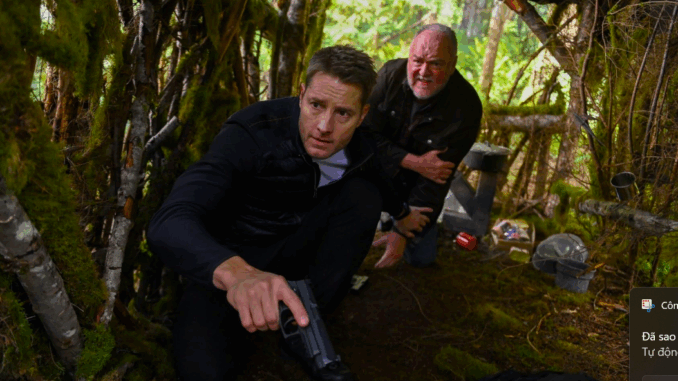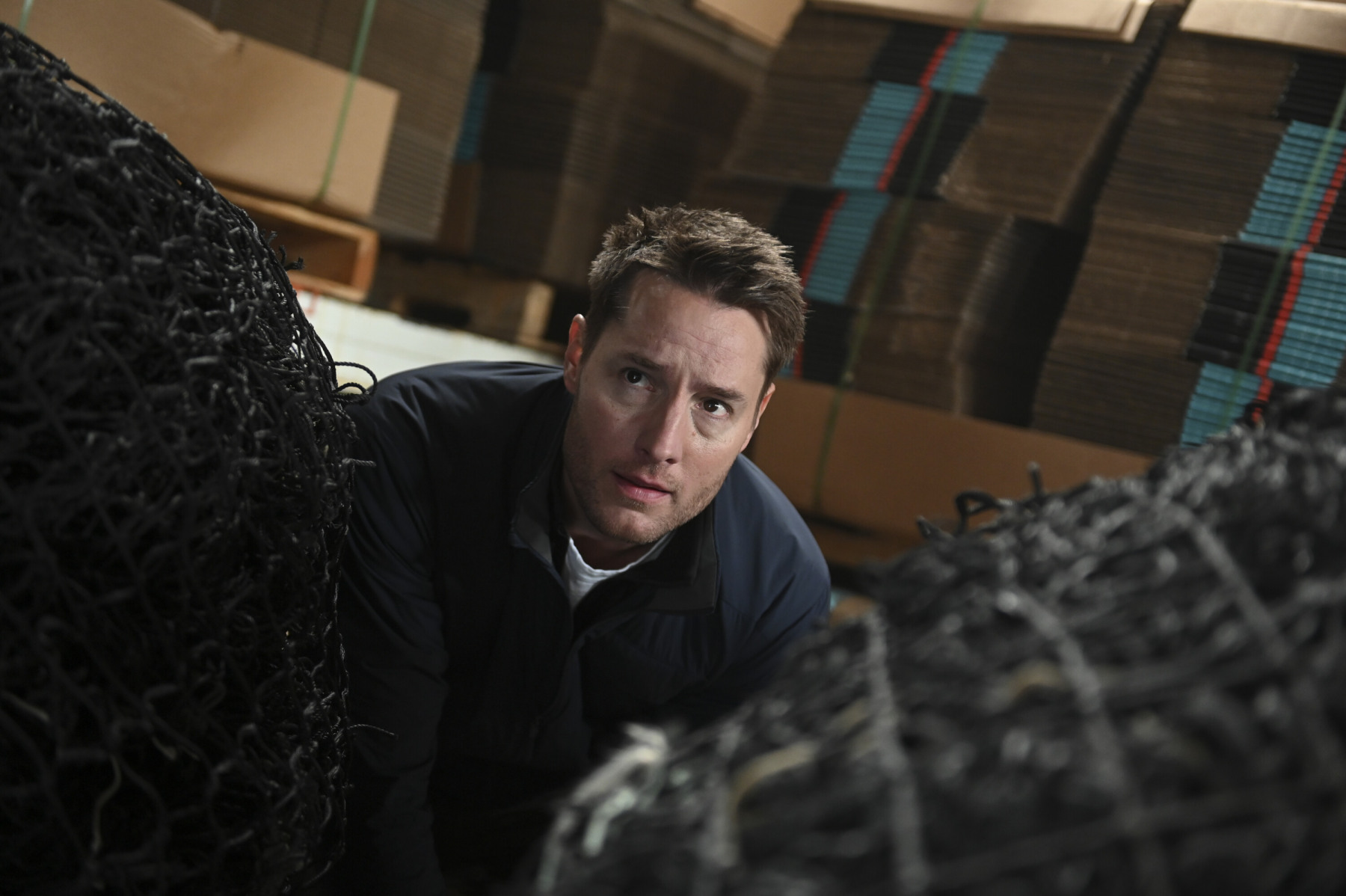
When Tracker first hit screens, audiences expected a gripping mystery. What they didn’t expect was a show that would deliver some of the most emotionally charged and visually stunning scenes on network television. From intense survival sequences to quiet moments of reflection, every frame feels alive — thanks to the chemistry of its cast and the authenticity of its storytelling.
The Man at the Center: Justin Hartley’s Magnetic Presence
As Colter Shaw, Justin Hartley doesn’t just play a tracker — he embodies one. Each scene he’s in feels grounded and lived-in. Whether he’s reading footprints in the dirt or facing down danger, his performance is all about control and quiet calculation.
But what truly elevates Hartley’s portrayal are the subtle emotional beats: the flicker of pain when Colter recalls his father, or the hesitation before he lets someone in. One standout moment comes in Season 2, Episode 5, when Colter confronts a grieving mother — his voice steady, but his eyes full of empathy. It’s acting stripped of artifice.

The Heartbeat of the Series: Fiona Rene as Reenie Green
Fiona Rene brings warmth and wit to the role of Reenie, the sharp-witted tech liaison who grounds Colter’s solitary nature. Their exchanges add levity and depth, reminding us that even the most independent man needs a tether to the world.
One of the most memorable scenes unfolds when Reenie risks her safety to track Colter’s signal in a storm. The camera cuts between her frantic typing and his silent struggle against the elements — two people separated by distance but united by trust.
The Emotional Core: Robin Weigert as Mary Dove Shaw
Playing Colter’s mother, Robin Weigert gives the show its soul. Her flashback scenes — often seen through Colter’s memories — reveal the complexity of the family that shaped him. She’s a symbol of strength and sorrow, torn between protecting her children and surviving her husband’s paranoia.
The confrontation between Mary Dove and her son in Season 1’s finale is one of Tracker’s defining moments. The way Weigert’s voice trembles as she says, “You inherited your father’s fire, but you have to learn where to aim it,” still resonates long after the credits roll.
A Show That Breathes Through Its Silences
Unlike many procedurals, Tracker doesn’t fear quiet. Some of its most powerful moments come when nothing is said — just glances, wind, and tension.
In one episode, Colter waits alone in an empty cabin for a suspect to return. No dialogue. Just the ticking of a watch, the creak of the floorboards, and Hartley’s stillness. The scene captures the essence of Tracker: precision, patience, and pressure.
The Cinematic Craft Behind the Scenes
Director Ken Olin and cinematographer David Stockton have crafted a visual language that feels more like a feature film than a weekly TV series. The camera doesn’t just follow Colter — it hunts with him. Sweeping drone shots of desolate landscapes emphasize his isolation, while close-ups reveal every flicker of emotion.
The use of natural light — sunsets bleeding through trees, headlights cutting through fog — adds a raw, almost poetic quality. Every chase feels intimate, every rescue personal.
The Supporting Cast: Unsung Heroes
Beyond the leads, Tracker thrives because of its rotating guest stars. Each episode introduces new faces, from desperate parents to cunning criminals, and they bring genuine humanity to the series.
Standout performances include Nicole Muñoz as a runaway teen searching for her brother, and Ian Tracey as a guilt-ridden hunter caught in a moral dilemma. Their stories remind viewers that Tracker isn’t just about solving cases — it’s about understanding people.
The Scene Everyone Talks About
Ask any fan, and they’ll mention the bridge rescue scene. In it, Colter climbs a collapsing bridge to save a stranded hiker. Rain pours, ropes snap, and the camera whirls as the structure gives way beneath them. But amid the chaos, there’s a calmness in Hartley’s voice as he tells the victim, “Trust the ground you can’t see.”
That line became symbolic for the show itself — a mantra for resilience in uncertainty.
Music and Emotion: The Unsung Storyteller
Composer Fil Eisler gives Tracker its heartbeat. The score blends haunting strings with rhythmic percussion, mirroring Colter’s tension and focus. In quiet scenes, soft piano notes remind us of the humanity behind the hunt.
The sound design also deserves praise — rustling leaves, footsteps, and distant thunder all heighten immersion, making the audience feel like they’re right beside Colter.
A Study in Character Growth
What makes Tracker truly special is how its characters evolve. Colter starts as a lone wanderer driven by logic, but over time, he learns to let others in. His relationships with Reenie and Bobby show cracks in his armor — glimpses of vulnerability that make him more than a hero.
By Season 3, fans see a Colter who no longer runs from his past but confronts it — one case, one truth, one scar at a time.
Real Stunts, Real Risks
Unlike many TV thrillers that rely heavily on CGI, Tracker often uses practical effects and real stunts. Hartley himself performs several physically demanding sequences — from scaling cliffs to wading through icy rivers.
Behind every action scene is a team of skilled stunt coordinators ensuring the danger feels authentic. That realism gives the show its edge — it’s not spectacle for spectacle’s sake, but storytelling through movement.
Fan Reactions: Why Viewers Are Hooked
Online forums and social media have exploded with praise for the show’s blend of emotion and suspense. Fans often highlight how Tracker balances high-stakes drama with quiet introspection.
It’s the kind of series where viewers don’t just watch — they feel. They root for Colter not because he’s flawless, but because he’s real.
Legacy in the Making
As Tracker continues, it’s carving out its own lane in television history — somewhere between Western, mystery, and character study. The cast’s performances, the emotional storytelling, and the breathtaking cinematography combine to create something timeless.
Conclusion: The Human Element Behind the Hunt
In a world full of procedural dramas, Tracker stands apart because it remembers what others forget — that every case is a story, and every story is about people. The show’s cast doesn’t just play their roles; they live them.
With each scene, they remind us that the journey to find others often leads us back to ourselves.
